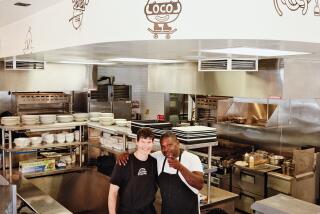Black Business Expo Assumes a New Tack
- Share via
Nine years ago, Culver City businesswoman Barbara Lindsey threw the first Los Angeles Black Business Expo. The half-day event, held at an airport hotel, drew 50 exhibitors and 1,500 visitors.
This year the business and trade show expects to attract 500 exhibitors and 40,000 visitors when it opens its three-day run Friday at the Los Angeles Convention Center.
More important than growth in size is the change in direction by the expo’s new owners, Watts Health Systems.
The nonprofit organization is gearing the weekend trade show to prompt year-round networking in the city’s African American community, whose business success still lags that of other ethnic and racial groups.
“We want to give much-needed support to small businesses,” said Harold Hambrick, a Watts vice president and the show’s executive director. “Small business is one of the solutions to unemployment and welfare.”
Watts Health Systems owns the 80,000-member United Health Plan HMO, has controlling ownership in Family Savings Bank and operates the Watts Health Center and a variety of other social service programs. The expo was a logical extension of its efforts to bolster the African American community, Hambrick said.
Watts persuaded Summit 2000, a national black economic advocacy organization formed after the Million Man March in 1995, to hold a seminar at the expo on business management skills, capital acquisition and technology. The coalition of civil rights and business groups, including the National Assn. for the Advancement of Colored People and the Urban League, holds economic development forums and is studying how to improve economic conditions for African Americans.
One aim of the expo is to form a buying club in which black-owned businesses would provide discounts to club members and thus encourage patronage of local African American businesses.
Another goal is to create trade associations for black-owned businesses in the grocery and restaurant industries, Hambrick said.
“The Korean Grocers Assn. does cooperative buying, and there’s a Latino grocer’s association, but to my knowledge, there’s not an African American grocers association,” Hambrick said.
Expo organizers also hope to use the expo (https://www.black businessexpo.com) to create a data base on black-owned businesses, because such data is hard to obtain.
The most recent federal Census Bureau data--from 1992--found that the Los Angeles metropolitan area has more than 32,000 black-owned businesses. That compares with 109,000 companies owned by Latinos and 92,000 owned by Asians. Those economic figures reflect cultural differences that leave blacks lagging behind, said Ed Maddox, a founder of Summit 2000.
“We, as a community, don’t have the awareness and understanding of business as other groups do,” Maddox said.
Unlike other groups who came as immigrants, some with entrepreneurial backgrounds, African Americans came to this country as slaves, Maddox noted.
The African American entrepreneurial spirit asserted itself in the South in the early 20th Century. Black-owned financial institutions known collectively as the “Black Wall Street” emerged in North Carolina, providing capital for thriving enterprises, Maddox said.
Migration to the north slowed that progress. Discrimination in lending and in corporate employment caused many blacks to turn to government jobs for economic advancement in the 1940s and 1950s, he said. But now that government and corporations are downsizing and affirmative action is under attack, blacks need to turn to entrepreneurship, he said.
Black Enterprise magazine Publisher Earl Graves, who will be at the expo to sign copies of his book “How to Succeed in Business Without Being White,” said African Americans should look for opportunities in franchising, high technology, contracts with major auto firms and health care, areas in which many blacks have made advances.
Lindsey, who now serves as a consultant to the expo she founded, said expo participants already are heading in that direction. Many more of the business owners who are exhibiting their products and services at the expo are former corporate employees who were downsized or left corporate jobs with early retirement to start their own firms.
“In the beginning of the expo, I had people who didn’t even know what kind of business they were in,” Lindsey said. “Now, we have people who are a lot more professional, committed and dedicated.”
More to Read
Inside the business of entertainment
The Wide Shot brings you news, analysis and insights on everything from streaming wars to production — and what it all means for the future.
You may occasionally receive promotional content from the Los Angeles Times.










